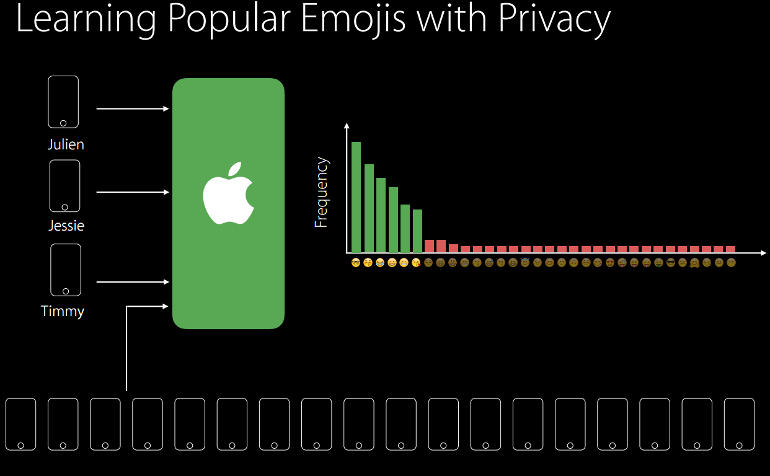
Apple has explained how it will use ‘differential privacy’ to improve emojis in iOS 10.
Image: Apple
Apple has shed some light on how it will begin mass data collection from its users without compromising their privacy.
The company announced at its developer conference that it will begin implementing ‘differential privacy’ in iOS 10 and macOS Sierra to make its products such as Siri smarter by collecting usage data on a large scale.
On Sierra, Apple’s differentially private method of collecting data will go towards improving autocorrect suggestions and Lookup Hints in Notes, while in iOS 10 it will also help QuickType and emoji suggestions, and deep-link suggestions in Spotlight.
While Apple has gone into some detail with developers about what differential privacy means and how it will be implemented, it hasn’t be so forthcoming with the public.
To clarify how it will collect more user data without harming end-user privacy, Apple told Recode that it will only commence collection in iOS 10 and that users will have the option to share or not share data with Apple.
Apple told developers that if users haven’t opted in to sharing diagnostics and usage data with Apple, their devices will not submit data to Apple.
Apple won’t use photos stored in iCloud to power its image-recognition features in iOS 10, but will rely on “other” unspecified data sets to train its algorithms, according to Recode.
Also, differential privacy will be initially limited to new words to improve the QuickType dictionary, emojis typed by the user, deep links inside apps, and lookup hints within notes.
Apple shared some of these details with developers at WWDC. For example, it may use data collected to reorder its emoji display, or to introduce popular slang words that aren’t currently in its QuickType dictionary.
It notes on its developer site for iOS 10 that it will use “differentially private” cryptographic hashes to assess the deep-link popularity of third-party apps.
These hashes are submitted to Apple’s servers from iOS devices. Apple will use these hashes to count how often popular deep links are visited without associating a particular user with a link. This approach gives it a way to promote more popular apps without harming users’ privacy.


